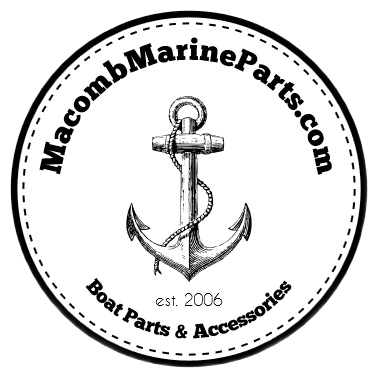Protect your order from Loss or Damage
Honda Large Bar Anode Zinc | Martyr CM06411ZW1Z
Honda Large Bar Anode Zinc | Martyr CM06411ZW1Z
Martyr (Canada Metal)
Buy Now Only: 1 Left!
Couldn't load pickup availability
Honda Large Bar Anode Zinc | Martyr CM06411ZW1Z
Martyr Honda Large Bar Anode Zinc | CM06411ZW1Z
- Honda Large Bar Anode Zinc
Fit the correct anode material for the waters in which your vessel operates
As a general rule, owners should fit anodes appropriate for the environment in which they most frequently berth, and the infomation below serves as a useful guide:
- Saltwater vessels should use Traditional (Zinc) Anodes
- Brackish water Vessels should use Premium (Aluminum) Anodes
- Fresh water vessels should use Fresh (Magnesium) Anodes
Anodes (Magnesium) Fresh
Some boats will alternate between salt and fresh water. Others are docked in marinas or behind tidal barriers. The water there is contained and likely to be brackish or nearly fresh. To avoid corrosion, boat owners must be aware of the consequences this may have on their vessels. Boat owners can then install the proper cathodic protection system.
Not all anodes are appropriate for every application.
For example, after a period of time in fresh water, the surface of a zinc or aluminum anode will become covered with an off-white crust of oxide. This essentially seals the anode and prevents it from functioning even when restored to saltwater. Zinc anodes have a similar difficulty even in brackish circumstances. Aluminum will continue to perform well in river estuaries and other brackish water areas indefinitely. Because the anode is passive, the next most anodic component in the anode bonding system will begin to sacrifice itself, which might be disastrous.
As a result, it is critical to inspect zinc and aluminum anodes after any trips into fresh water. If necessary, clean or replace the anodes. Martyr recommends that if a vessel is in fresh water for more than two weeks, an alternative anode system suitable for fresh water situations be used.
Magnesium anodes, on the other hand, have a much higher driving voltage than zinc or aluminum, making them ideal for use in fresh water; however, they will become very active in salt water, where they will likely last only a few months. Protected surfaces can accumulate an off-white calcareous deposit that is difficult to remove.
Magnesium anodes are not intended for prolonged use in salt water, and if you plan to leave your boat in salt water for more than seven days (fourteen days in any given year), you should consider replacing the anodes.
Honda Large Bar Anode Zinc | Martyr CM06411ZW1Z
Martyr Honda Large Bar Anode Zinc | CM06411ZW1Z
- Honda Large Bar Anode Zinc
As a general rule, owners should fit anodes appropriate for the environment in which they most frequently berth, and the infomation below serves as a useful guide:
- Saltwater vessels should use Traditional (Zinc) Anodes
- Brackish water Vessels should use Premium (Aluminum) Anodes
- Fresh water vessels should use Fresh (Magnesium) Anodes
Some boats will alternate between salt and fresh water. Others are docked in marinas or behind tidal barriers. The water there is contained and likely to be brackish or nearly fresh. To avoid corrosion, boat owners must be aware of the consequences this may have on their vessels. Boat owners can then install the proper cathodic protection system.
For example, after a period of time in fresh water, the surface of a zinc or aluminum anode will become covered with an off-white crust of oxide. This essentially seals the anode and prevents it from functioning even when restored to saltwater. Zinc anodes have a similar difficulty even in brackish circumstances. Aluminum will continue to perform well in river estuaries and other brackish water areas indefinitely. Because the anode is passive, the next most anodic component in the anode bonding system will begin to sacrifice itself, which might be disastrous.
As a result, it is critical to inspect zinc and aluminum anodes after any trips into fresh water. If necessary, clean or replace the anodes. Martyr recommends that if a vessel is in fresh water for more than two weeks, an alternative anode system suitable for fresh water situations be used.
Magnesium anodes, on the other hand, have a much higher driving voltage than zinc or aluminum, making them ideal for use in fresh water; however, they will become very active in salt water, where they will likely last only a few months. Protected surfaces can accumulate an off-white calcareous deposit that is difficult to remove.
Magnesium anodes are not intended for prolonged use in salt water, and if you plan to leave your boat in salt water for more than seven days (fourteen days in any given year), you should consider replacing the anodes.
🔥Ships Next Business Day🔥
Order within 20 Hours 50 Minutes 34 Seconds
Receive By 04/10
Want it sooner? Select Express Shipping at Checkout!
Faster Shipping Options Available at Checkout!
Low Discounted Prices!
Pay in 4 Interest-Free Installments!
Orders Over $99 Ship Free! **Some Exclusions Apply
Faster Transit Options Available at Checkout
Faster Transit Options Available at Checkout
Faster Transit Options Available at Checkout








